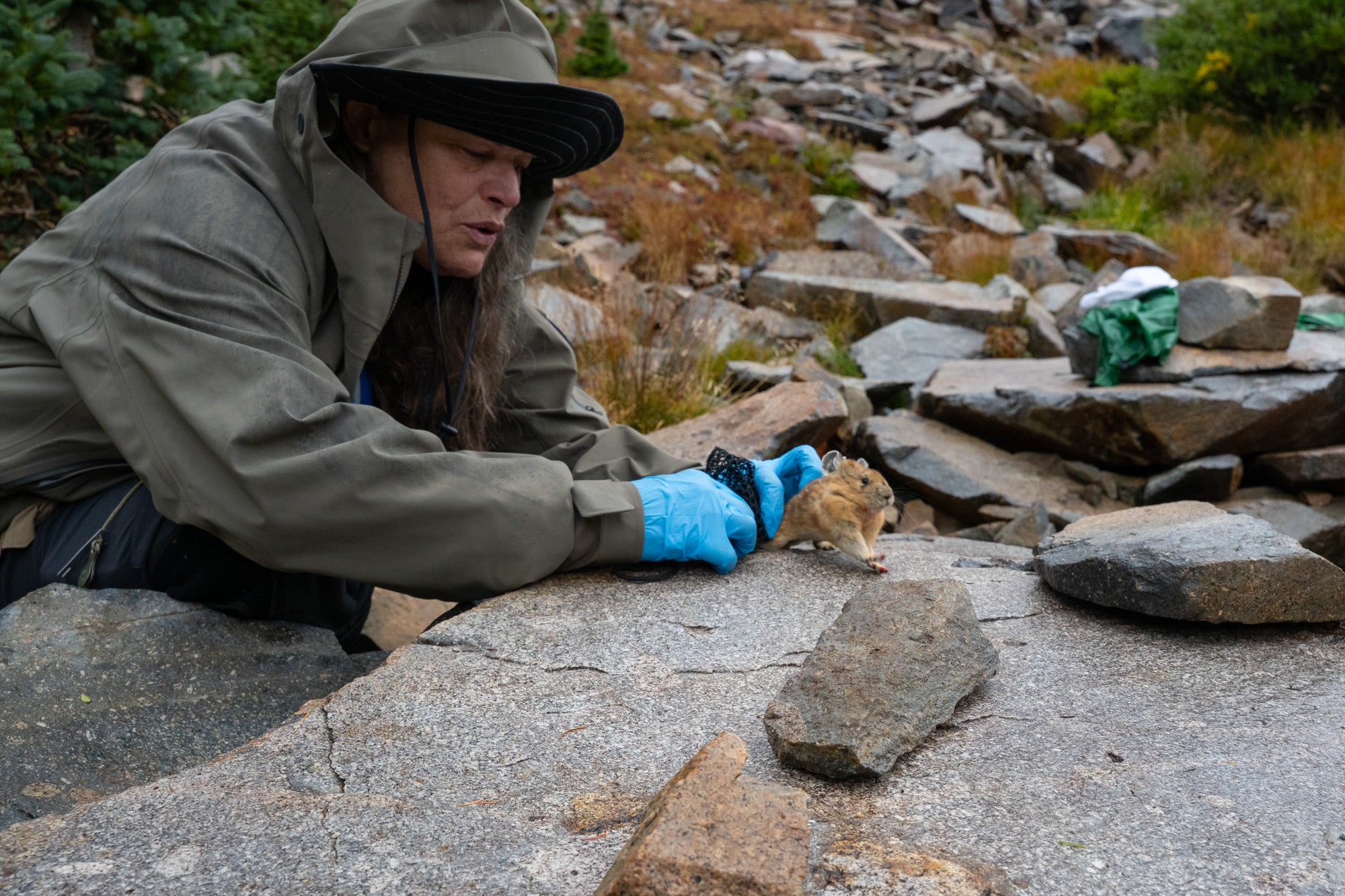Science
Researchers Use Acoustic Fingerprinting to Study Pikas’ Calls

On a cool, foggy morning in September 2025, wildlife biologist Chris Ray and PhD student Rachel Mae Billings conducted an innovative study of pikas, small mammals known for their distinctive calls. Situated on a mountain slope near Mitchell Lake in the Indian Peaks Wilderness, the duo aimed to develop a method to identify individual pika calls through a technique known as “acoustic fingerprinting.” This approach could revolutionize the way researchers gather data on these animals, offering insights previously unattainable through traditional trapping methods.
Pikas, which are closely related to rabbits, communicate using a series of sharp, staccato calls. These vocalizations serve multiple purposes, including warning others of danger, establishing territory, and attracting mates. By distinguishing between individual calls, Ray and Billings hope to monitor pika populations over time, collecting health and survival data without invasive methods. “My life would be so much easier if I could just take a microphone out and sit in each territory and get a few calls,” Ray noted. “Then I could go back and see whether I get the same individual next year.”
Ray has dedicated her career to studying pikas since 1988, primarily focusing on the effects of climate change on their populations. Pikas thrive in cool, rocky environments, but changing temperatures and precipitation patterns have led to some populations becoming isolated or disappearing altogether. A study published by Ray and her collaborators a decade ago warned that warming trends could eliminate pikas from significant portions of their habitat by the end of the century. Yet, ongoing research has revealed that some populations are adapting to their changing environments.
“I’m interested in whether or not that’s actually happening,” Ray explained. “Pikas are really good at finding microclimates that suit them.” To investigate, she continues to monitor pika populations across the American West, returning annually to collect data with a team of volunteers and collaborators.
Innovative Techniques for Monitoring Pika Populations
When Billings approached Ray for mentorship in her PhD studies, it presented a unique opportunity. With a background in electronics engineering and a focus on quantitative biology, Billings possessed the skills necessary to develop tools for identifying differences in pika calls. “She has the right background to work on a bioacoustic project — and she’s really good at it too,” Ray remarked.
This summer, the research team began recording audio of pikas that had previously been tagged and characterized. The next phase involves analyzing these recordings to identify “acoustic fingerprints.” Billings plans to use spectrograms, which graphically represent sound waves, to determine whether these calls are unique enough to differentiate between individual pikas.
“If you look at a graphical representation of a pika call, it sort of looks like a thumbprint,” Billings explained. “The goal is to collect enough recordings to see, are these really unique enough to tell them apart?” If successful, this technique could enhance research capabilities significantly.
The team has already set up solar-powered audio recorders at various field sites on Niwot Ridge, capturing a vast amount of acoustic data. “We have terabytes of acoustic data from Niwot Ridge already,” Billings said. The ultimate aim is to analyze this data to infer population trends and track individual survival without needing to capture and tag the animals each year.
While the concept of acoustic fingerprinting is still in its theoretical stage, Billings plans to dedicate the winter months to refining the methodology. Should this approach not yield results, the team is exploring other non-invasive methods to enhance their understanding of pikas. One alternative includes analyzing pika droppings for “DNA fingerprints,” a technique that has become more accessible as genetic analysis technology advances.
Another ongoing initiative, the Colorado Pika Project, relies on community involvement. Volunteers across the state monitor pika populations, and as of 2022, citizens can report their sightings through a mobile app called Pika Patrol.
Addressing Climate Change Challenges
The urgency of this research stems from pikas being particularly sensitive to climate change. “The pika has been singled out as one of the animals more sensitive to climate change,” Ray stated. The objective is clear: to understand how these charming creatures adapt to some of the planet’s most challenging climates and whether they are nearing their environmental limits.
As the research progresses, the hope is to gain deeper insights into the lives of pikas and implement measures to safeguard their future in a rapidly changing environment. This innovative approach, combining technology and citizen science, exemplifies the potential for new methodologies to enrich our understanding of wildlife and the impacts of climate change.
For further inquiries or to engage with the research community, interested parties can contact Senior Communications Specialist Gabe Allen at [email protected].
-

 Sports2 weeks ago
Sports2 weeks agoSteve Kerr Supports Jonathan Kuminga After Ejection in Preseason Game
-

 Top Stories6 days ago
Top Stories6 days agoMarc Buoniconti’s Legacy: 40 Years Later, Lives Transformed
-

 Business2 weeks ago
Business2 weeks agoTyler Technologies Set to Reveal Q3 2025 Earnings on October 22
-

 Science2 weeks ago
Science2 weeks agoChicago’s Viral ‘Rat Hole’ Likely Created by Squirrel, Study Reveals
-

 Politics2 weeks ago
Politics2 weeks agoDallin H. Oaks Assumes Leadership of Latter-day Saints Church
-

 Lifestyle2 weeks ago
Lifestyle2 weeks agoKelsea Ballerini Launches ‘Burn the Baggage’ Candle with Ranger Station
-

 Lifestyle2 weeks ago
Lifestyle2 weeks agoDua Lipa Celebrates Passing GCSE Spanish During World Tour
-

 Entertainment2 weeks ago
Entertainment2 weeks agoZoe Saldana Advocates for James Cameron’s Avatar Documentary
-

 World2 weeks ago
World2 weeks agoD’Angelo, Iconic R&B Singer, Dies at 51 After Cancer Battle
-

 Business2 weeks ago
Business2 weeks agoMLB Qualifying Offer Jumps to $22.02 Million for 2024
-

 Sports2 weeks ago
Sports2 weeks agoPatriots Dominate Picks as Raiders Fall in Season Opener
-

 Health2 weeks ago
Health2 weeks agoRichard Feldman Urges Ban on Menthol in Cigarettes and Vapes









